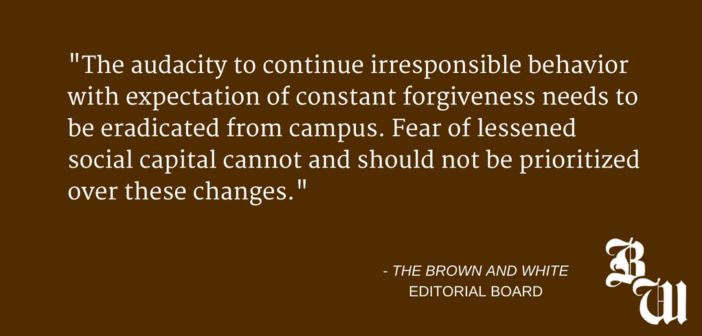Somewhere in the archives of the Lehigh administration sits a draft of two documents: an email and a press release.
It’s nothing short of a miracle neither of them will be seen by the rest of the Lehigh community or the public. And it is certain that if they had been sent out, the consequences would have been permanent.
Panhellenic president Margaret Burnett, ’17, made this clear at a student-hosted town hall April 26. She alluded to the closest call we’ve had in years, when a student almost died with a blood alcohol level of 0.39, which is nearly five times the legal limit in Pennsylvania. The situation was so dire the hospital called Lehigh’s offices and told them to be ready to contact next of kin.
It’s just one way Lehigh’s drinking culture has proved to be problematic.
As much as we can attempt to blame it on the seldom-used medical amnesty policy, the escalated presence of the Lehigh University Police Department, or the removal of the collaborative initiative to host “epic party weekends” on the Hill this semester, we haven’t acted responsibly enough to expect a compromise with the administration.
If we don’t recognize this reality and act while we still can, it will be a disgrace. There are no more boundaries to push without ending in tragedy.
That’s why it was laughable to hear a crowd member at the town hall legitimately claim it isn’t fair to threaten the prosperity of Greek life over the actions of less than 1 percent of its members.
The comment was referring to the three Greek members — out of four total cases in a couple of months — who have been considered a “close call” from alcohol poisoning. But it completely ignored the 80 incidents, ranging from citations to hazing allegations, which occurred in the first few weeks of the spring semester alone. Besides that, even one close call is too many.
Truthfully, Greek chapters are heavily scrutinized for this problem that is not exclusive to Greek life. But the majority of them have done nothing to deserve the university’s cooperation as of yet.
The Lehigh Greeks blog has been riddled with conduct updates all semester long, including a recent measure taken against Kappa Alpha when it was caught with an alcohol-related offense less than 12 hours after its president met with the Office of Student Conduct about a prior violation.
Even if we get everyone on board with the notion that there is a problem, though, it will not be easy to fix it. Changing a culture is near-impossible at times, especially when it is ingrained not just in students, but also the long-lasting legacy of Greek life at Lehigh.
Clearly it needs to start at an individual level. We need students to start internalizing personal responsibility to prevent excessive alcohol consumption. We need to stop encouraging our peers to drink to a point where they are in danger.
But that’s not enough.
It has gotten to the point where every executive board of every organization that participates in social events must meet and take a detailed look at how it can lessen risk. Even the ones that have not been in trouble with Lehigh must be vigilant in their safety procedures.
The audacity to continue irresponsible behavior with expectation of constant forgiveness needs to be eradicated from campus. Fear of lessened social capital cannot and should not be prioritized over these changes.
Greek organizations have some extra motivation given the confirmation from Student Senate president Dakota DiMattio, ’17, that she has had in-depth conversations with administrators about what Lehigh might look like without Greek life.
Improved behavior from organizations will undoubtedly make it easier for leaders on campus to negotiate specifics with the administration such as the medical amnesty policy and the return of parties to campus. Lehigh has no reason to meet us in the middle when they have no trust in us.
Until we get to that point of trust, we have a lot of work to do.
If we don’t get started soon, the university will likely take drastic measures to avoid the need to send out the template email and press release with a new name.






Comment policy
Comments posted to The Brown and White website are reviewed by a moderator before being approved. Incendiary speech or harassing language, including comments targeted at individuals, may be deemed unacceptable and not published. Spam and other soliciting will also be declined.
The Brown and White also reserves the right to not publish entirely anonymous comments.
5 Comments
This. All of this.
Preach.
I agree COMPLETELY. First off, ditch the Medical Amnesty policy. If you’re caught drinking excessively (or, god forbid, drinking underage), you NEED to be punished, not only by Lehigh, but also by the police as described in PA’s underage drinking statutes. Seriously, enough of this coddling. Take responsibility for your own actions. I myself am a recovering alcoholic, and believe me when I say that tough love is the only way to stop this.
It hurts Lehigh students when legal action is pursued when they are caught drinking, even if responsibly, as excessively is extremely subjective, and would likely be considered above the legal limit (0.08 BAC). Should you receive a permanent infraction for consuming a legal substance one year before you legally can which can impact things such as employment?
Additionally, you’re being hypocritical, either students should curb their own drinking being personally/ privately responsible, or they be seen as incapable of making their own decisions and punished to alter their behavior.—
“Take responsibility for your own actions.”
“If you’re caught drinking you NEED to be punished be (taught a lesson by someone else).”
Furthermore you’re wrong regarding medical amnesty as students who call it often still do face citation.
Plus why would I want to take advice from an alcoholic? Brad Carter- ‘Credibility through substance abuse?’
Ditching Medical Amnesty is absolutely ridiculous, and will only lead to more endangerment of students.
If there is anything to be learned from history, policies reminiscent of the Prohibition era are bound to fail. When the University cracked down on social events on the hill (back before I was even a freshman), the only thing that changed was that the functions moved to off campus houses, where there are far more dangers. Draconian policies will only endanger the lives of more students by pushing drinking underground and discouraging people to get help when they need it.
Given the ever-rising cost of tuition, it is not prudent to spend precious university dollars to create a police state. Rather, responsibility rests on the individual to know his or own limits and learn when to say enough is enough.